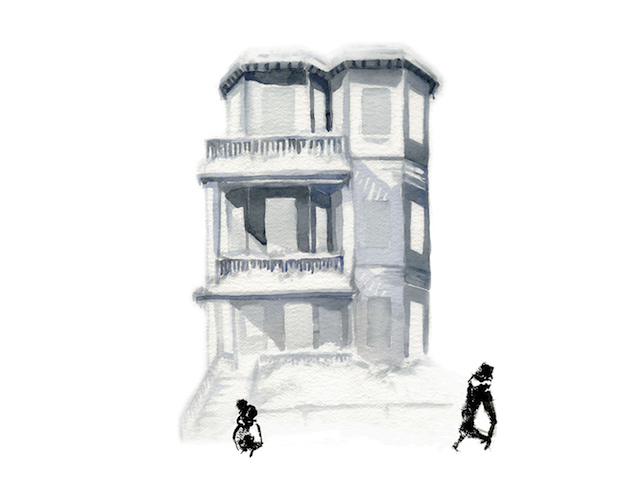‘The image of my small life without the young man was one of a library with its doors locked, or simpler and more terrifying, that of a book with half its pages missing.’

July 10, 2015
The following is an excerpt from Jennifer Tseng’s debut novel Mayumi and the Sea of Happiness, published by Europa Editions this May. Forty-one-year-old Mayumi works as a librarian on a small island off the coast of New England. Her days are routine and unremarkable, until the day she issues a library card to a shy seventeen-year-old boy.
Although I love books and although I have obviously devised ways of benefitting from my position, I am, in many ways, ill-suited to being a librarian. Though I shelve cart after cart without complaint, though I give excellent recommendations and can intuit a patron’s needs, I otherwise have few, if any, of the appropriate talents. My ability to lose myself while engaged in mindless tasks notwithstanding, I don’t like to smile when I’m in a foul mood, I’m prone to carpal tunnel syndrome (nowadays everything in the library is done on computers), I don’t feel the need to pick up the phone during the first ring (or at all frankly) nor do I want so desperately to please others that I will skip a lunch break in order to do so. I care little for best seller lists and book reviews, I fail to watch PBS, to listen to NPR, to read The New Yorker, not to mention mainland newspapers. Indeed I am embarrassingly out of touch with what is popular in the book world. I have a strong musical voice that lends itself to whispering on occasion but for which the daily imperative is a prison. My most glaring deficiency is that I am not detail-oriented, although I lied unwittingly during my preliminary interview and described myself as such. In truth, before being initiated into that Mansion of Minutia, I had no idea the true meaning of the phrase. Put another way, I had no idea how well the librarian’s vocation lends itself to existential crisis.
The entrance of Mother and Son into said Mansion enhanced my vocation and its meaning considerably. The seasonal Japanese restaurant worker who accelerated my pulse every summer and fall, the one-hundred-year-old woman whose barbed comments regularly stung me, the savage children whose despicable manners once annoyed me, now had a tranquilizing effect. All patrons now had a tranquilizing effect. They belonged to a race of people who were other than the young man. In their presence, I was unassailable. I exuded confidence. Behavior I might once have found irritating now amused me if it touched me at all. I was overwhelmed by a new sense of ease, with every breath conscious of my remarkable lack of nervousness. All of this was in contrast to the feverish, heart-racing state of wanting and agitation I experienced in his presence.
No longer was the library a saltbox of Time, Patience, and Tedium that I approached with a sense of duty and occasional hesitation. Now it was a fulminous palace of Fate, Beauty, and Possibility waiting to be entered. Existential crisis averted, meaning revealed, weather uncertain, engine revved, for the first time in years, I was eager to go to work. I saw myself lurching forward, careening when necessary, pressing my foot casually yet heavily upon the gas, daring even, on occasion, to lift my hands from the wheel. And yet the word “wheel” misleads, for I was not driving but being driven. (Indeed I did not even have a driver’s license!) But by what or by whom? A boy in high school? The power differential be damned, whatever the force, I could not stop it. And why should I? No crime had yet been committed, not a single offense taken. My joy was everywhere evident.
Who dares to block joy’s tidal wave? Who if they try can stop it? But I defend myself, a useless exercise. Then it was like reading of love in a book. One feels the many pleasures without inflicting any pain. In the end, no one is hurt or saved but the solitary reader. When one closes the book, life resumes. The husband continues to irritate, the child continues to breathe heavily in her sleep, her skin persists in smelling like cake, her washed hair of flowers.
Prior to the young man, I had avoided my own reflection (unlike Maria who climbed and then sat for hours upon the dresser like a cat, luxuriating in the sight of herself, rapt with her own facial expressions, her own ability to move: a sly squinting of the eyes, a feline flicking of her tongue, the tart raising of her bare backside up in the air). Now I peered curiously into the mirror, I lingered in the moments during which I changed out of my white flannelette, a gown given to me by my chaste Aunt Tomoko. I gazed at the back of myself in particular, at once with a mother’s loving eye (I had become much less critical of the human form since becoming a mother) and with the shy yet avid eyes of the young man, recalling expressions I had seen upon his face across the counter. To my surprise, I, he, we, liked what we saw. I began indulging in daily showers, a habit I’d given up the day Maria was born. I primped myself like never before (not that I had a very impressive primping history) and felt an irrepressible sense of buoyancy during the hour before going to work.
More than ever, I read. I visited other libraries, (another old habit revived) perhaps searching for the book that would inform me of what to do next, perhaps hoping to find that in one of these parallel universes, the young man still existed. There is a library in every town on this island. I fought the urge to borrow sensational nonfiction paperbacks pertaining to our situation, as well as reference books containing relevant laws and legal precedents. It was, I reasoned, too risky; no one understands better than a small town librarian how little privacy borrowers possess.
I would wander the stacks of the strange library in search of nothing in particular, sometimes choosing a letter of the alphabet to guide me, sometimes a subject like dark matter or French cooking. There were days I chose a book because I liked or disliked the cover or because I liked or disliked the author’s name. Other days I would go straight to a beloved book and borrow the book that was to the immediate left or right of it. Books are not so different than people. Often the person across the room with whom you first lock eyes should be bypassed in favor of the quieter, less charismatic person standing next to them. What’s more, one’s longing for a stranger can be a longing for someone invisibly connected to that stranger.
As if to practice understanding said stranger, I began reading books in translation. Like a schoolgirl for whom passion is a novelty, I read love stories. I read more than one book in which a pair of lovers meets for the first time on a train. In one, translated from the Greek, the two encounter one another on a commuter train. Daily they observe one another until at last one morning they speak. In another, translated from the Spanish, a man is traveling cross-continent and for several hours he observes intently a woman sleeping across from him. How I envied these lovers their proximity to one another, their being at liberty to observe!
Then again, had the young man and I met on a train, I might have wished we had met in a library (One is doubly afloat in an island library, surrounded by water, surrounded by books.), in a sanctuary that never arrives late or suddenly, one that never departs slowly, only to disappear out of sight. In its intimacy and safety, a library is the opposite of a train. It is that which remains, that which holds people (children are the exception here) while they are, for the most part, not in motion, that which holds people while they dream, while they resist travel even as they read of other worlds.
The young man was like one of these exceptional children. He never paused for long in front of any bookshelf, he never sat in an armchair and fell asleep, only twice did I see him sit at a computer terminal for more than ten minutes. To be writing intently while wearing headphones does not compare to being asleep. The beloved’s degree of oblivion dictates one’s freedom to observe. And I, busy with my endless sequence of minute tasks, I, in my furrowed brow and compulsive friendliness, could not have been further from the man who sits idly in his train seat with a smooth, placid face, inspecting alternately and at his leisure the landscape to his right and the sleeping woman before him.
In fact, it disturbed me to think of having met the young man on a train, for there were no trains on the island. Residents who wished to visit the mainland traveled by ferry or, if they were endowed with wealth, by propeller plane. There was once a railroad but it was destroyed over a century ago, dead before either of us was born. Many islanders, especially the young who cannot come and go as they please, have never seen a train, much less traveled on one. If I had met him on a train it would not have been him at all but another version, perhaps a Londoner or a Bostonian. I had no interest whatsoever in meeting any such foreign replacement. In the end, every book I read left me in the place where I’d started: on the island again. In the apartment, in the woods, at the library. No trains, no daily observances, no sign whatsoever of the young man.
* * *
One night in the parking lot, Siobhan finally posed the question that even I had begun to consider but did not want to hear.
“What if he never comes back?” she asked. I feel a strange tenderness for her now, a gratitude in retrospect for her willingness to be so direct with one so convoluted.
“I haven’t the faintest idea,” I snapped, sounding haughty and imperious yet feeling bereft. “I’d rather not think of it in those terms if you don’t mind.”
“Terms?” she queried. “I’m not talking about terms, I’m talking about reality. There’s a fifty percent chance he’ll come in, a fifty percent chance he won’t. All I’m sayin’ is what if he doesn’t? What if that’s the outcome?” She was standing on the asphalt next to her car and I was standing at the opening in the trees that led to the museum garden. We always parted ways there.
She was trying to take me by the hand and lead me to a precipice, to the edge of a darkness I dared not fall into. The image of my small life without the young man was one of a library with its doors locked, or simpler and more terrifying, that of a book with half its pages missing.
“He’ll come back,” I said with false confidence as I moved toward the trees. But then, unable to leave it at that I stopped and asked, “What makes you think he won’t?”
“Nothin’. Just that he hasn’t been by in a long time so I’m thinkin’ maybe he’s gone off to college.” His mother must have known but I couldn’t bring myself to ask.
“But it’s the middle of the academic year.”
“Okay, or maybe he just moved away. Maybe he got a job on the mainland. I don’t know. I just want you to be prepared for what might happen.”
“I am prepared,” I said, startled by the sound of my own conviction. “I couldn’t be more prepared for his return.”
As Siobhan climbed into her car, I felt a moment of envy for her practical outlook, immediately followed by a surge of pity for her lack of relationship with the young man.
“But what if he never comes back?” she asked once more, her well-tended hands resting gently on the steering wheel. “Or what if he does? Then what?”
“He’ll come back,” I said, my vision of his return now so exact that I felt no need for verification. “And when he does, I’ll be at the ready.”
I said this as if speaking of a storm for which I had long been preparing. My hatches were battened, my provisions set aside; whether the storm was on its way or simply imagined, there was nothing left for me to do but wait.



